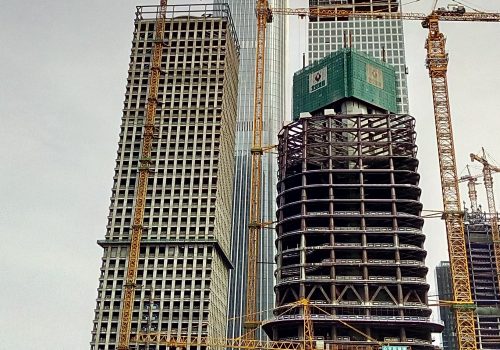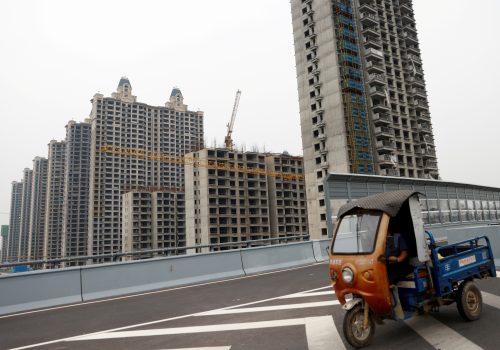To Bailout or not? This is Xi’s question.
The Evergrande Group is the second largest Chinese property developer by sales. On September 23rd and 29th it missed payments on dollar bonds worth $131.5 million. The global markets are increasingly worried about the company’s ability to manage its $305 billion liabilities and the crisis’ ramifications on the fragile global economy. The recent news coming out China is adding to that worry. Last week, Fantasia Holdings Group Co. defaulted on $206 million of dollar bonds and this week, Modern Land (China) Co. is asking for investors’ permission to defer a $250 million bond payment due later in October.
However, during his pre-recorded address for the 76th session of UN General Assembly on September 21st, President Xi Jinping made no mention of the Evergrande crisis and that of the other heavily indebted corporate giants. Instead, Xi reiterated the same themes of shared prosperity and inclusive growth for the global economy that he emphasized domestically before Evergrande’s crisis. In particular, the main agenda for China’s Financial and Economic Affairs Committee meeting on August 17th was “common prosperity”. Xi chaired the meeting for the first time and told officials that “the government should regulate excessively high incomes and encourage high-income groups and enterprises to return more to society”.
President Xi is rightfully concerned about growing inequality in China. As seen in Figure 1 and 2 below, the income and wealth share of those in top 1 percent and top 10 percent increased substantially in China in the past three decades. Comparatively, Chinese individuals in the middle 40 percent and bottom 50 percent have seen their share of income and wealth decline significantly. This is especially true when it comes to net personal wealth: in 2015 the top 1 percent controlled 30 percent of all personal wealth in China — up from 16 percent in 1990. The top 10 percent of Chinese households owned more than two-thirds of all personal wealth in the country — up from 41 percent in 1990.
The Evergrande crisis could challenge Xi’s determination to address the increasing level of wealth and income inequality in China, a considerable portion of which has been fueled by rising wealth disparities in the housing sector. Evergrande’s default could lead to a series of contagions inside China’s financial markets. This outcome would pose serious risks for China’s financial industry and the overall economy. This would be especially concerning for Chinese officials. It was the newly implemented government regulations on borrowing limits of developers — the “three red lines” and requirement that property lending make up less than 40 percent of Chinese banks’ total loans — that dried up credit to developers and sent Evergrande and other developers scrambling for liquidity. Such concerns, in addition to outraged homeowners and wealthy investors and “trusts”, could pressure the government to take action to prevent an outright Evergrande default. However, this outcome is not immediately likely and will not happen until the company sells off all non-core assets.
A government bailout would also contradict Xi’s recent messaging emphasizing wealth redistribution inside China, shared prosperity for all, and holding indebted corporate giants and their investors responsible for their own fate. Rather than letting Evergrande collapse, it might be more effective for Beijing to consider a bail-in. By holding the largest shareholders and creditors responsible, the Chinese government could safeguard the average Chinese taxpayer from the fallouts of an Evergrande collapse or the massive costs of a bailout.
This is especially true in the case of Evergrande as compared to other Chinese property developers. Evergrande has run out of chances. Its top executives have already been summoned and warned before about the risks they were taking — most recently by the China’s Banking and Insurance Regulatory Commission on August 19th, 2021. The Commission told Evergrande executives to get their act together and “strive to maintain operation stability”. Government assistance will be an especially hard sell given that Evergrande’s top executives continued to receive lavish dividends while the company took on more debt. Since the company went public in 2009, it has paid out dividends on annual basis (except 2016) while its debt increased every year. According to Forbes, Evergrande paid its Chairman Hui Ka Yan — who has a 77 percent stake in the company — a whopping sum of $8 billion in cash dividends as the company piled on liabilities year after year. The bulk of these payments, equaling more than $5 billion, were transferred between 2017 and 2019, the period during which Evergrande’s liabilities increased by 60 percent from $179 billion to $286 billion.
Therefore, an Evergrande bailout would only reinforce the “business-as-usual” mentality in China’s real estate sector. This attitude is unwelcome, as massive speculations in the housing sector have pushed housing prices beyond the reach of China’s growing middle class in many cities — especially during the pandemic. These price increases have mainly benefited the rich and the well-connected, making it harder for authorities to justify an Evergrande bailout to the public because a bailout would be seen as an enormous subsidy for the rich at the cost of average Chinese. Moreover, the moral hazard fallouts of an Evergrande bailout cannot be overestimated. Only five of the 52 largest Chinese real estate developers are in the “green zone” or within the “three red lines” outlined by the government in August 2020. Hence, for Beijing, a bail-in may be the most effective response to the current crisis. In addition to preventing an outright Evergrande default and a potential meltdown in Chinese financial markets, a bail-in could also serve as a reminder for other heavily indebted corporate giants and their largest shareholders and investors to fix their finance before it gets too late.
Related content

At the intersection of economics, finance, and foreign policy, the GeoEconomics Center is a translation hub with the goal of helping shape a better global economic future.
Image: China's president, Xi Jinping, gives an online speech at the Boao Forum for Asia on April 20, 2021. Photo via Kyodo and Reuters.

